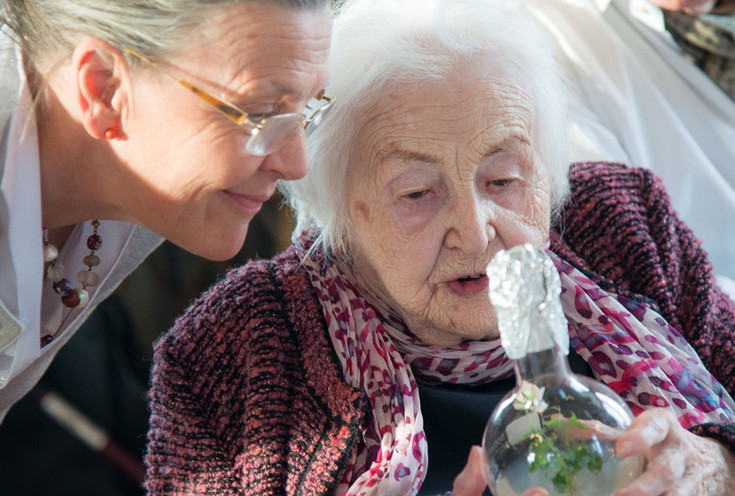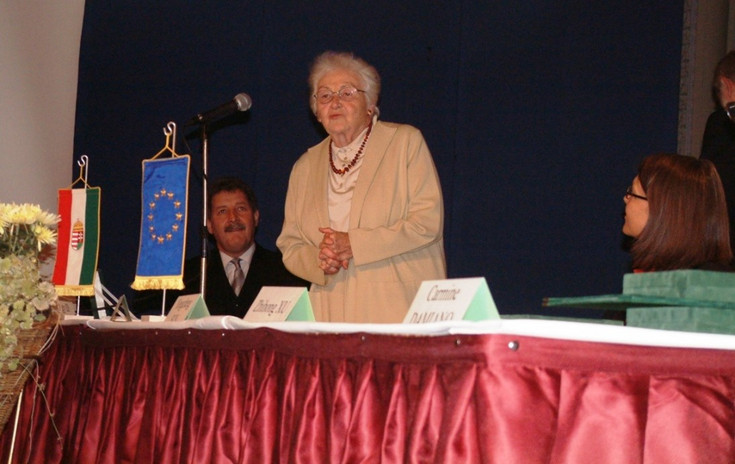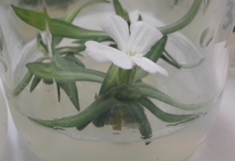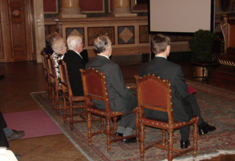Obituary Dr. Waltraud Rücker (1922-2024)
Obituary Dr. Waltraud Rücker (1922-2024)
In vitro flowering Silene sp. From Siberian permafrosts (kindly obtained from our Russian colleagues) maintained at PBU, in Vienna

The doyenne of plant tissue culture in Austria, Priv.-Doz. Dr. Waltraud Rücker, passed away on November 7, 2024 at the age of 102. This is how Prof. Otto Härtel, the successor to Gottlieb Haberlandt in Graz, described Waltraud Rücker many years ago at a ceremony in the Josephinum, in Vienna.
To be recognized as the founder of a discipline in her own country is a high distinction for a scientist. Waltraud Rücker's pioneering achievements paved the way for many other scientific works and findings.
Waltraud Rücker never tired of emphasizing that everything we think has its origins in the intellectual achievements of others. Throughout her life, she upheld the role of Gottlieb Haberlandt, an Austrian botanist with Hungarian roots and founder of physiological plant anatomy, and it was also thanks to her enthusiasm for his pioneering work that we jointly organized an international symposium on the 100th anniversary of his groundbreaking publication and finally published a book on plant tissue culture.
But first things first:
Gottlieb Haberlandt's groundbreaking publication “Culturversuche mit isolierten Pflanzenzellen” (Culture experiments with isolated plant cells) in 1902 contained his vision of the totipotency of the plant cell, although it was not realized until 1939 in the laboratory of Prof. Dr. Roger Gautheret in Paris.
In the 1950s, at Professor Engelbert Broda's Institute of Chemistry, Dr. Waltraud Rücker was introduced to plant tissue culture by Professor Georg Melchers and founded plant tissue culture in Austria.
At the beginning of the 1960s, Waltraud Rücker was entrusted with the task of setting up a laboratory for plant cell and tissue culture at the Seibersdorf Research Center. She gained the necessary experience from the Laboratoire de Biologie Végétale at the Sorbonne under Roger Gautheret, the leading authority in this field at the time. Waltraud Rücker brought in-depth knowledge from the Gautheret laboratory back to Austria and established a completely new research field.
In the Seibersdorf laboratory, a wide range of fundamental plant physiology and applied questions were finally addressed.
In the 1970s, Waltraud Rücker moved back to the University of Vienna, formally to the Institute of Plant Physiology, in fact to the Institute of Pharmacognosy, where a small but fine, fully functional laboratory for plant tissue culture was set up with project funds in the basement of the University Dental Clinic.
I was able to make her scientific acquaintance during my practical training in plant physiology, where she initiated us into the secrets of plant tissue culture on the balcony of the lecture hall of the Institute of Plant Physiology on the roof of the University of Vienna. It was such a formative experience that I was later to write my dissertation with her. Above all, I learned to appreciate her absolutely critical and precise approach to setting up experiments and evaluating my own data, as well as her sense of linguistic precision and subtle humor.
As a “pupil” of Roger Gautheret, she always gave me the impression of being his intellectual grandchild. In fact, “schools” and research groups have emerged in the field of plant tissue culture that follow a leading model or guiding principle.
While some research groups placed applicability at the center of their efforts, in the case of Gautheret's school of thought, it was a quest for knowledge of plant development that regarded the gain of knowledge almost as “l'art pour l'art!”, a viewpoint probably threatened with extinction today.
I have always been particularly fascinated by Waltraud Rücker and her illustrious circle of friends because of their particularly subtle sense of humor. This form of sophistication was probably rooted in a deep experience of tragic events that can only be endured with a special sense of humor. The story of the potato-counting professor who can't get off the ground, because “every potato is a decision”, and the description of our “excentric coffee” as the “experiment of the day” may perhaps illustrate this.
I was particularly struck by the power of doubt with which Waltraud Rücker approached every scientific experiment. I learned rigorous planning and careful repetition of experiments from her. “How can you say that with such certainty?” was a standing phrase that often made me almost despair when evaluating my experiments. However, I think this question should be asked much more often today, in line with the principle of falsification.
Waltraud Rücker has successfully transferred her enthusiasm for the developmental capacity of plant cells to a large number of students, diploma and doctoral students throughout her life as a researcher.
What was astonishing about Waltraud Rücker was the great social commitment she maintained, which certainly did not make her life any easier. Long before the opening of the Iron Curtain and the eastward expansion, scientific guests from neighboring countries to the east visited our laboratory in Währingerstrasse. And when really bad news came from the East, we had to go to the post office with coffee parcels. Above all, however, she taught her students that life always brings new challenges.
Waltraud Rücker was a little absent-minded, especially when it came to her VW Beetle. We often ran out of gas in the middle of the city, even from Währingerstrasse to Rudolfsplatz, or on the way back from a seminar by Prof. Riklef Kandeler at the University of Natural Resources and Life Sciences.
As far as the topics were concerned, Waltraud Rücker mainly dealt with plant physiology issues, which had different focuses depending on the cooperation partner.
For her lectures, Waltraud Rücker meticulously and lovingly produced a large collection of slides, which not only show the numerous stages of development observed and achieved, especially of medicinal plants, but also illustrate the individual work steps. Waltraud Rücker has kindly donated this collection to the PBU at the BOKU.
In 1984, Dr. Waltraud Rücker was awarded a teaching license by the Faculty of Natural Sciences of the University of Vienna at the Institute of Plant Physiology as a university lecturer in “Plant Physiology with special consideration of plant tissue culture”.
After 1989, she moved her activities and, above all, many of her cultures to the newly founded in vitro laboratory at the Schönbrunn School of Horticulture.
Waltraud Rücker also continued to work with us in the BOKU plant biotechnology group. In 1998, we celebrated the 100th anniversary of Haberlandt's idea with a symposium, because Haberlandt must have already had the idea and started working on it if he was able to publish it in the reports of the K&K Academy of Sciences in 1902. In 2003, we jointly published the commemorative volume “Plant Tissue Culture: 100 Years since Gottieb Haberlandt” with Springer Verlag.
Univ.-Doz. Dr. Waltraud Rücker was National Correspondent of the IAPTC for over 30 years, since its foundation in 1971, and in this function contributed to the organization of the German Botanical Congress in 1984 and the 17th International Botanical Congress in Vienna in 2005. I have since taken over this function from her.

Univ.Doz. Dr. Waltraud Rücker at the award ceremony at the University in Debrecen in 2004
Univ.Doz. Dr. Waltraud Rücker 2006 at the presentation of the Golden Doctorate Diploma at the University of Vienna
For her lifelong dedication to plant tissue culture, Univ.-Doz. Dr. Waltraud Rücker was awarded the Gottlieb Haberlandt Prize in 2004.
At the University of Vienna, Univ.-Doz. Dr. Waltraud Rücker was awarded the Golden Doctorate in 2006 on the occasion of the 50th anniversary of her PhD graduation.
There is no better way to describe the presence of Dr. W. Rücker in our midst than with the words of Ludwig Jacobowski, “Bright Days. Do not cry because they are past! Smile, because they once were!”
a.o. Univ.-Prof. Dr. Margit Laimer, November 2024, Vienna, Austria


